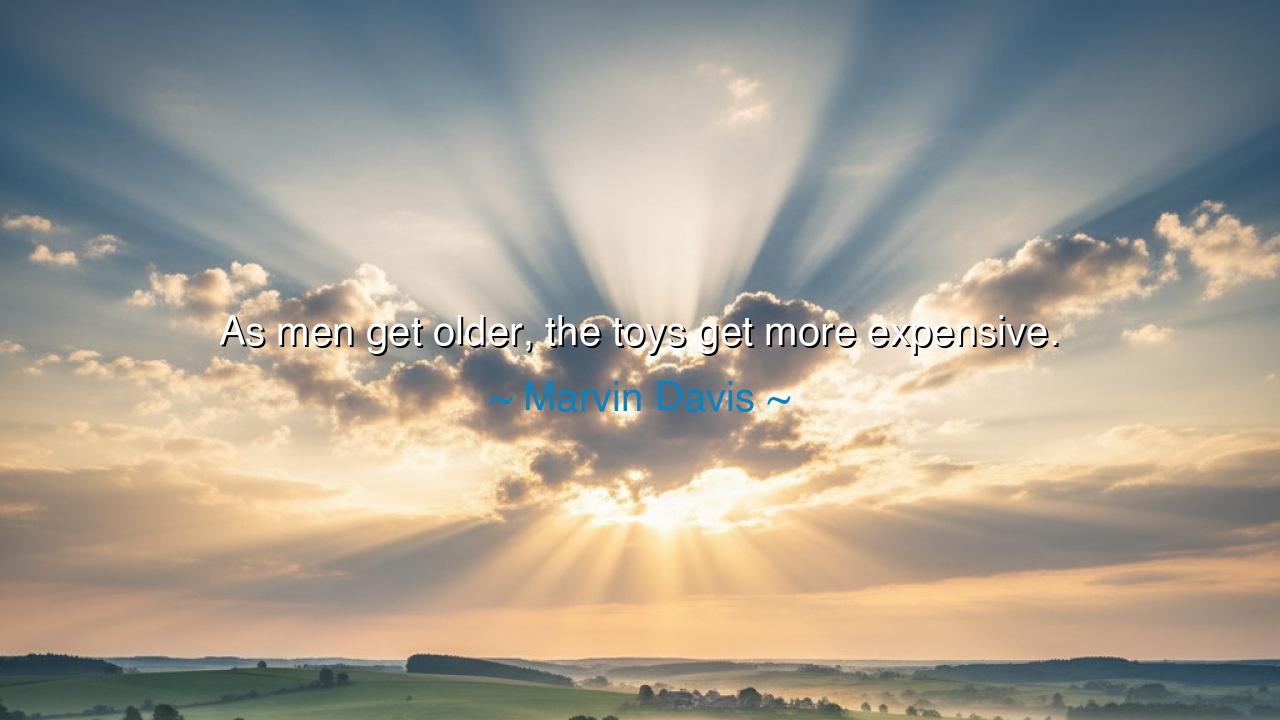
As men get older, the toys get more expensive.






"As men get older, the toys get more expensive." These words, spoken by Marvin Davis, offer a sharp reflection on the nature of desire, ambition, and the evolution of human need over the course of a lifetime. At first glance, this statement may appear simple, even humorous, but beneath it lies a profound understanding of the human condition—the restless, ever-changing nature of our wants and the ways in which they shift as we grow older. Toys, in Davis' view, symbolize the things that captivate our attention, things we once desired for fun, for escape, or for status. As we age, our pursuit of these toys evolves, and what once seemed to be a simple joy now becomes something more costly, more complex, and perhaps more reflective of our ambitions and life’s journey.
In youth, the toys we seek are simple—perhaps a ball, a toy horse, or a cherished object that brings us joy without thought of consequence. They represent freedom, play, and the unburdened heart that seeks nothing more than the thrill of the present moment. The world in our youth is full of wonder, and our desires reflect a simple quest for happiness. But as we age, these desires grow not only more expensive but more complicated, often entwined with the aspirations we hold for success, recognition, or security. The toys of our youth, once innocuous, now take on the shape of luxury items, status symbols, and even tools of power or control. In the end, the price of these toys reflects our inner desire for validation, for a sense that we have accomplished something grand, something worthy of admiration.
Consider the life of Alexander the Great, who as a young man sought not just toys in the form of simple pleasures, but conquests. His desires were once focused on the excitement of battle, the thrill of victory, and the glory of expanding his empire. But as he grew older, those ambitions transformed into a deeper, more expensive pursuit—the creation of a legacy that would last for generations. The toys of his youth, though mighty and powerful in their own right, shifted to the complex desires of empire-building, a goal that ultimately came with the cost of his life. His toys became the empire, the title of king, and the quest for immortality—each more expensive than the last, yet never fully satisfying the restless heart of a conqueror.
In more modern times, consider the path of a business magnate like Steve Jobs. In his youth, the toys that captured his attention were the simple gadgets of technological innovation—tools that promised to reshape the world. But as he grew older, the toys of his success were no longer just about the next great invention; they became about creating a legacy, a company, a brand, a global revolution. The price of these toys grew exponentially, not in mere dollars, but in the sacrifices of personal time, relationships, and peace of mind. The toys became the driving force of his life, each pursuit requiring greater resources, more effort, and more soul than the one before it. Jobs’ life illustrates how the simple desires of youth can evolve into monumental, expensive pursuits that often come at a higher price than we can anticipate.
Davis’ quote also reveals a fundamental truth about maturity—that as we age, our desires grow not only in complexity but in their cost. This cost is not merely monetary, though it often is; it is also spiritual, emotional, and mental. The toys of our youth gave us immediate satisfaction, but as we grow older, we begin to seek out meaningful pursuits, things that align with our legacy or with the desire to be remembered. These desires often lead us down a path where the price becomes more than we bargained for, whether in terms of time, effort, or the loss of simpler joys.
The lesson we can draw from Davis’ words is this: the pursuit of happiness evolves throughout our lives, and the toys we seek in our youth often give way to more complex, expensive desires as we age. However, it is important to understand that the cost of these toys—whether material or philosophical—may not always be worth the sacrifice. As we grow older, we must reflect on what truly matters, lest we become ensnared in the chase for validation and achievement. Let us not allow our desires to become a burden, but instead find a way to pursue the things that will bring us true fulfillment—things that do not cost the earth, but that enrich our hearts and minds in a way that simple toys cannot.
In our own lives, let us recognize that while ambition and achievement are worthy pursuits, they must be tempered with wisdom. Let us learn to find joy in the simple toys—those that enrich our spirit, not just our status. As we age, may we seek out balance, understanding that the most expensive toys are often not the most fulfilling. Value is not determined by the price we pay but by the meaning we derive from our pursuits. Let us, therefore, embrace the toys of life with wisdom, recognizing that what we desire in youth may not be what sustains us in later years. And in this realization, may we find true happiness—not in the expensive toys we accumulate, but in the richness of a life well-lived.






AAdministratorAdministrator
Welcome, honored guests. Please leave a comment, we will respond soon